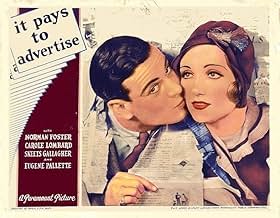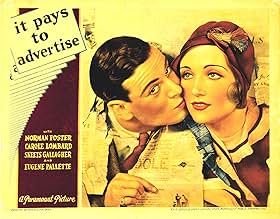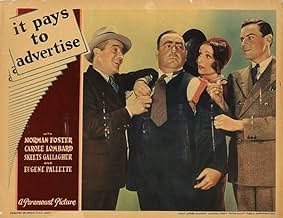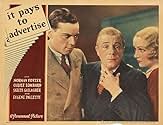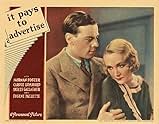Ajouter une intrigue dans votre langueTo prove his thesis that any product--even one that doesn't exist--can be merchandized if it is advertised properly, a young man gets together with his father's savvy secretary to market a n... Tout lireTo prove his thesis that any product--even one that doesn't exist--can be merchandized if it is advertised properly, a young man gets together with his father's savvy secretary to market a non-existent laundry soap. Complications ensue when his "product" turns out to be more succ... Tout lireTo prove his thesis that any product--even one that doesn't exist--can be merchandized if it is advertised properly, a young man gets together with his father's savvy secretary to market a non-existent laundry soap. Complications ensue when his "product" turns out to be more successful than even he imagined--and now he has to deliver.
- Réalisation
- Scénario
- Casting principal
- Récompenses
- 1 victoire au total
- Countess de Beaurien
- (as Helen Johnson)
- Office Boy
- (as Junior Coghlan)
- Man Putting Sign on Car
- (non crédité)
- Photographer
- (non crédité)
- Photographer
- (non crédité)
- Reporter
- (non crédité)
Avis à la une
Norman Foster plays Rodney Martin, playboy son to self made man Cyrus Martin (Eugene Palette), head of a soap company. Cyrus has paid 5000 dollars to his secretary, statuesque Mary Grayson (Carole Lombard), to make Rodney fall in love with her and therefore stop his silly publicity stunts that make dad look bad in the papers and go to work. Cyrus promises her another 5000 if the whole thing works out with Rodney being a serious working man.
Cyrus pretends to be outraged by the match, pretends to fire Mary, pretends to cut off Rodney without a cent if he goes through with any marriage to her, but it is all a ruse. But the ruse is about to get out of Cyrus' control.
Rodney meets up with slick publicity man Ambrose Peale (Skeets Gallagher), playing his usual mischievous part. Ambrose suggests they start on an advertising crusade for a product that doesn't even exist yet - "13 soap". It's named by Rodney and the name means "Our soap is an unlucky number for dirt". Rodney is determined to beat dad at his own business. So soon there are jingles, ads, billboards with pretty girls in bathtubs (this is the precode era - anything goes) all over town. But Rodney and Ambrose have spent so much money on making their product a household word they have nothing left to make a product with, much less pay the rent.
Cyrus is angry at the 13 Soap ads everywhere he looks, and a competitor accuses him of making his son's company a front for his own soap and withdraws from their mutual agreement not to get into advertising wars. Worse yet, Mary is falling for Rodney for real.
So Rodney has name recognition and no product and no money. Dad has a product, money, and no ad campaign. How will this all work out? Watch and find the humorous answer.
This is the beginning of Eugene Palette's grumpy roles, a type of character that he made famous in "My Man Godfrey" and "The Lady Eve" - the put upon self made man of industry with daffy relatives that don't know the value of a dollar. If you are expecting Carole Lombard the screwball comedienne to show up here, she has not found that persona yet. As for Skeets Gallagher, he was always fun whenever he showed up in early Paramount roles.
The only reason I can figure that this one doesn't have a higher rating is that the copy in general circulation is a poor print taken from old VHS tapes when it was shown on TV twenty or thirty years ago. That doesn't mean that the film is not clever and well done. I'd recommend it.
There are some strong ideas in the adapted screenplay concocted between Ethel Doherty and Arthur Kober. I detect lively and varied character writing, and sharp and sometimes cutting dialogue. The narrative is complete and cohesive, and like the scene writing that builds it, is slanted strictly toward fun. The situational comedy at the heart of 'It pays to advertise' produces light amusement that's good for some soft chuckles. And yet - more so than not, half the runtime has passed before a real sense of entertainment manifests. Even still, and almost as prevalent in the second 30 minutes as in the first, there are instances where scenes are overfull, or self-indulgent, and unnecessary to either the levity or the story being told. Other scenes feel underwhelming, or ill-considered. I think the writing is stronger than not in wide strokes, but it's a bumpy ride.
That leaves the direction. Frank Tuttle's name isn't well known to me, but I suppose it should be, seeing as how he betrayed fellow leftists to fascists in the U. S. government during the McCarthy era. That doesn't speak to his worth as a filmmaker, of course, but to his character - yet if 'It pays to advertise' is any indication, one facet is just as flawed as the other. If the cast isn't to blame, nor the writing, for the broadly spiritless lack of meaningful merriment, then it must be Tuttle. This picture is derived from a play, and with the absence of any music for 98% of the duration, it certainly feels like it. If Tuttle took the notion of such adaptation a step too far, perhaps that explains the restrained air about the acting and the entertainment at large. It's worse than that, though: so wholly bereft is the feature of real, lasting mirth that it comes across not as a motion picture, not as a stage play, but almost as more of a table reading, with no vigor beyond what one may summon while seated in a chair. I don't know about Norman Foster, Richard Gallagher, or others involved here, but I do know that Lombard, Brooks, and Pallette are far, far better than this.
I want to like this more than I do, but the passing enjoyment to be obtained herein is scarcely greater than what any fundamental presentation of light and sound may portend. It's harder still to take pleasure in the production when the cinematography and sound design seem flat and hollow, diminishing what can be perceived on a rudimentary level of some intended jokes. And with that, it's difficult to care much about rounding details like art direction or production design. I began watching with high expectations based on the cast alone, but the level of Good Times to be had with the feature can maybe best be visualized as a bell curve - a mostly straight line along the horizontal axis, with a thin, short protrusion in the middle. There is some value here, but plainly not enough to make it especially worthwhile. Unless you have a distinct reason to seek it out, 'It pays to advertise' isn't really a movie I can recommend.
Very short and not really worth anyone's attention.
Workhorse director Frank Tuttle has a great set-up for a satirical farce, but the only accomplished farceur in the bunch is Pallette. Gallagher is a distant second because he can talk almost as fast as Glenda Farrell, but Miss Lombard hasn't developed any comedy chops as yet. What's left is far too mannered and standard to be of much interest.
And Louise Brooks. She's in this movie, so she must be mentioned. She appears in the first couple of minutes as a stage dancer with whom Foster is baiting reporters for publicity for a stage show. She gets to show off her legs a couple of times, then disappears.
Tuttle himself would never gain great accomplishment as a comedy director, although he would direct a fair number of them in the course of his career. He was a director who could direct anything competently, although his real strength, it would turn out, was in crime dramas. He was a key man in the rise of film noir in America, directing the 1935 proto-noir version of THE GLASS KEY and Alan Ladd in THIS GUN FOR HIRE. This comedy, however, doesn't quite ring the bell.
Le saviez-vous
- AnecdotesDirector Frank Tuttle has an uncredited role as a reporter in one scene.
- Citations
Rodney Martin: Listen, Father, I want to get married.
Cyrus Martin: Married? You don't actually mean that you want to marry this, er chorus girl, do you?
Rodney Martin: She isn't a chorus girl, Father. She's the star.
Cyrus Martin: I don't care what she is.
Rodney Martin: Well now wait a minute. Let's get this straight; I don't want to marry that girl.
Cyrus Martin: No? Well, then who is the girl? Who is she?
Rodney Martin: The girl?
Cyrus Martin: Why, certainly - the girl. You're not going to marry a polo pony, are you? Who is the little, gurgling, blue-eyed fool?
Rodney Martin: Well, now Father, she isn't a fool and she doesn't gurgle. Her name is Mary Grayson.
Cyrus Martin: What! My secretary?
Rodney Martin: Yes, Sir.
Cyrus Martin: I won't permit it.
Rodney Martin: No?
Cyrus Martin: No, Sir. I'll disinherit you and I'll fire her. You can starve together!
Rodney Martin: I knew you'd be reasonable about it! Good old Dad.
Cyrus Martin: Get out!
Rodney Martin: And never darken your door again, I know. But look Father, you can't do this to me.
Cyrus Martin: No? What are you going to do about it?
Rodney Martin: Well, I'll, er, get a job.
Cyrus Martin: Why, you don't even know what the word means.
Rodney Martin: Maybe I'll look it up.
Cyrus Martin: That'd even be too much work for you.
Rodney Martin: Maybe I'd get my secretary to do it.
Cyrus Martin: Get out!
- ConnexionsFeatured in Arena: Louise Brooks (1986)
Meilleurs choix
Détails
- Durée
- 1h 3min(63 min)
- Couleur

